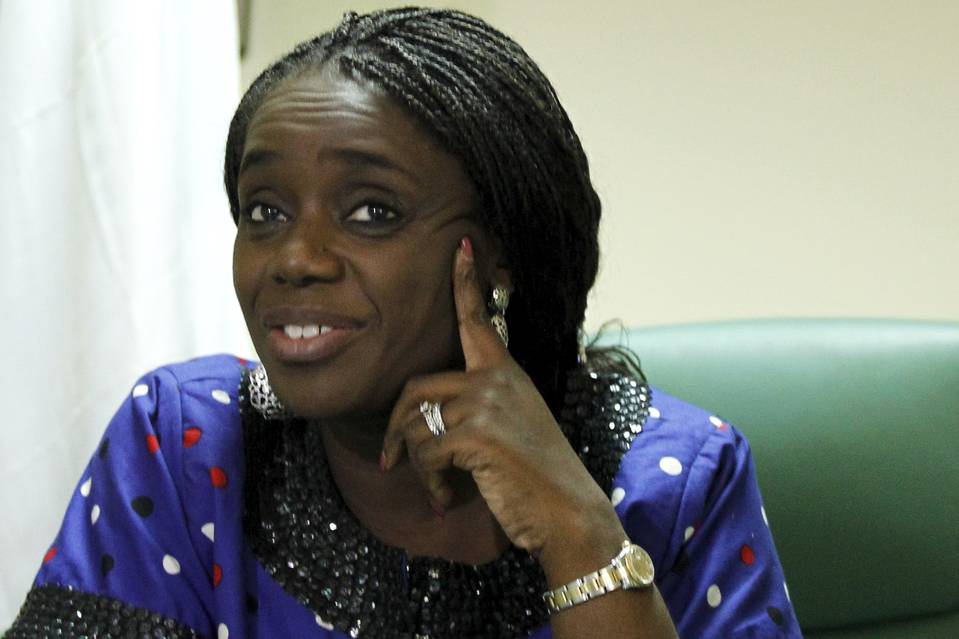- Adeosun Confirms N350bn Release for Capital Projects
The Minister of Finance, Mrs. Kemi Adeosun, on Monday confirmed the release of the sum of N350bn to Ministries, Departments and Agencies of the Federal Government for the implementation of capital projects contained in the 2017 budget.
She confirmed the development exclusively to our correspondent during a telephone interview.
The 2017 budget, christened: ‘Budget of Recovery and Growth, was presented to the National Assembly on December 14, 2016, and passed by the lawmakers on May 11, 2017.
The fiscal document, which was signed into law by the then Acting President Yemi Osinbajo on June 12, 2017, has a total expenditure of N7.44tn, out of which N2.99tn is for non-debt recurrent spending; N2.36tn for capital expenditure; while debt servicing is to gulp N1.66tn.
Adeosun had on June 6, during the public presentation of the budget, stated that the Finance ministry was ready to release the sum of N350bn for capital projects once the budget was loaded.
The minister, while responding to enquiries by our correspondent on the development, explained that the funds had been released to the various agencies of government.
She said the release of the funds was done in tranches with the Ministry of Power, Works and Housing getting the highest amount of capital releases.
This, according to her, is followed by the ministries of transport, defence, and agriculture and rural development.
She said water resources, interior and health were among the ministries with huge sums of capital releases made to them by the Federal Government.
“Yes, we did it (N350bn capital release) in tranches. Largest allocations were for the PWH (power, works and housing), transport, defence, agric, water resources, interior and health,” Adeosun said.
The 2017 budget, with capital allocation of N2.36tn, is targeted at projects that are aligned with the core execution priorities of the Economic Recovery and Growth Plan
The capital allocations have been crafted to stimulate activities in critical sectors of the economy that have quick transformative potential such as infrastructure, agriculture, manufacturing, solid minerals, services, and social development.
For instance, under the 2017 budget, the Federal Government will be embarking on a rail modernisation programme to which N148bn has been allocated as counterpart funds for projects to be financed by China.
They are the Lagos-Kano, Calabar-Lagos, Kano-Kaduna, Ajaokuta-Itakpe-Warri, Kaduna-Idu and other rail projects.
In the area of electricity, the sum of N40bn for service-wide provision has been made to settle reconciled outstanding bills of government agencies as part of a strategy to revamp the ailing power sector.
For the housing sector, the sum of N28bn was allocated in the budget for the Federal Government’s National Housing Programme nationwide.
The Minister of Budget and National Planning, Udo Udoma, had during the budget presentation shortly after it was assented to by Osinbajo, had said the government was concerned about the number of abandoned projects scattered across the federation.
He added that more targeted releases would be done to agencies of government for projects that were critical to the achievement of the ERGP.
Udoma noted that in this year’s budget alone, funds had been allocated to over 65 roads and bridges and rehabilitation projects across the six geo-political zones of the country.
Some of them are N10bn for the rehabilitation/reconstruction and expansion of the Lagos-Ibadan Expressway sections I and II in Lagos and Oyo states; N13.19bn for dualisation of the Kano-Maiduguri road, sections I-V; N10.63bn for the rehabilitation of Enugu-Port Harcourt dual carriageway, sections I–IV; and N7bn for the construction of the Second Niger Bridge, phases 2A and 2B, including access roads.
There are also budgetary provisions of N7.12bn for the dualisation of the Abuja-Abaji-Lokoja road; N9.25bn for the dualisation of the Obajana junction to Benin road, phase two, sections I–IV; N7.5bn for the rehabilitation of the Onitsha-Enugu dual carriageway; N7bn for the construction of the Bodo-Bonny road, with a bridge across the Opobo Channel.
Similarly, the sum of N3.3bn was budgeted for the rehabilitation of the Ilorin-Jebba-Mokwa-Bokani road; N3.5bn for the dualisation of the Odukpani-Itu-Ikot Ekpene Federal highway lot 1, Odukpani-Itu bridgehead; N1.5bn for the dualisation of the Kano-Katsina road phase one; and N2.24bn for the dualisation of the Suleja-Minna road, sections I and II, among others.
Udoma had said, “We can’t be doing the same thing and expect different results. We have to do targeted releases by looking at the projects we can easily complete and which are important.
“We are working on that to make sure that over time, we concentrate our resources so that we have maximum impact.”

 Forex2 weeks ago
Forex2 weeks ago


 Naira2 weeks ago
Naira2 weeks ago
 Naira4 weeks ago
Naira4 weeks ago
 Company News4 weeks ago
Company News4 weeks ago
 Billionaire Watch1 week ago
Billionaire Watch1 week ago




 Naira2 weeks ago
Naira2 weeks ago




 Naira4 weeks ago
Naira4 weeks ago




 Naira1 week ago
Naira1 week ago






















